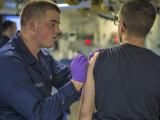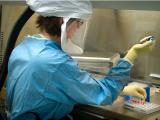Dec 31, 2002 (CIDRAP News) – Individuals receiving smallpox vaccine should wait 3 weeks before donating blood, according to guidance issued yesterday by the Food and Drug Administration (FDA). The recommendations are being issued as a precautionary measure to reduce the "very slight risk" of bloodborne exposure to vaccinia virus in certain patient populations, according to the agency. While comments are invited, FDA is advising immediate implementation because of the impending vaccination program for millions of professionals deemed to be at risk for occupational exposure in the event of a smallpox outbreak.
Among the specific recommendations are these:
- Vaccinated people should wait to donate blood until 21 days after vaccination or until the scab has fallen off spontaneously, whichever occurs later.
- Vaccinees in whom complications develop should wait until 14 days after complications have completely resolved before donating blood.
- If a blood center finds that blood has been accepted from a donor who has been vaccinated too recently for the blood to be considered safe, the blood should be destroyed or used only for research or for products that will not be used in humans.
- If a person is inadvertenly given blood that should have been deferred because of recent smallpox vaccination of the donor, the blood center should consider the need for prompt record-tracing and notification of the treating physician or the recipient.
The recommendations were developed in consultation with vaccinia virus experts at the Centers for Disease Control and Prevention and the Department of Defense. They pertain only to nonemergency smallpox vaccination and could be modified in the event of an actual or impending smallpox outbreak—and the more widespread vaccination effort that would ensue—to adapt to changing risk/benefit assessments and other public health considerations, according to FDA.
The planned vaccination program, announced Dec 13 by President Bush, has two phases in regard to civilian workers. In the first, up to 500,000 healthcare and public health workers most likely to be exposed to the first cases in a smallpox outbreak will be given vaccine on a voluntary basis. The second phase would provide smallpox vaccinations, again on a volutary basis. to about 10 million healthcare and emergency workers (eg, ambulance drivers, firefighters) who could be at risk for occupational exposure in an outbreak. Members of the general public who request vaccination will be accommodated even before licensed vaccine is available in 2004, although vaccination for this population is not recommended.
Research reports in 1930 and 1953 reported that vaccinia virus could sometimes be isolated from a vaccinated patient's blood 3 to 10 days after vaccination, although the virus used was more virulent than the strains in currently used vaccines. Research in the 1960s involving the less virulent strains was able to detect virus only in the blood of patients with disseminated infection but not in the blood of patients with localized lesions. These studies' usefulness is limited because of study size; research is now in progress to more acccurately define the presence and frequency of the virus in the blood after vaccination.



















